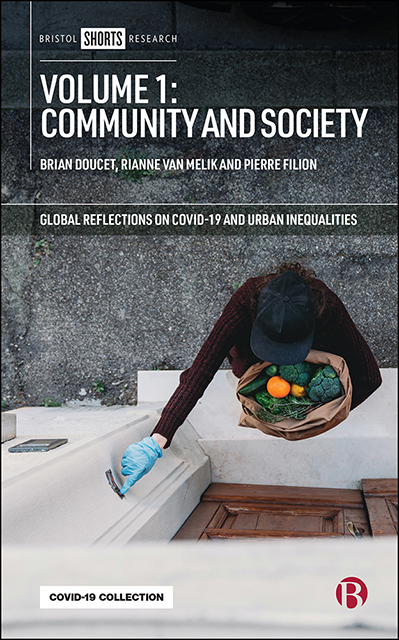Book contents
- Frontmatter
- Contents
- List of Figures and Tables
- Notes on Contributors
- Acknowledgments
- Preface to All Four Volumes of Global Reflections on COVID-19 and Urban Inequalities
- One Introduction
- Part I Working Practices
- Part II Life During Lockdown
- Part III Migration, Migrants, and Refugees
- Part IV Age, Race, Gender, and Ability
- Index
Twenty - The Role of Social Infrastructures for Trans People During the COVID-19 Pandemic
Published online by Cambridge University Press: 13 April 2023
- Frontmatter
- Contents
- List of Figures and Tables
- Notes on Contributors
- Acknowledgments
- Preface to All Four Volumes of Global Reflections on COVID-19 and Urban Inequalities
- One Introduction
- Part I Working Practices
- Part II Life During Lockdown
- Part III Migration, Migrants, and Refugees
- Part IV Age, Race, Gender, and Ability
- Index
Summary
The relationship of lesbian, gay, bisexual, transgender, and queer (LGBTQ) people and cities, and the urban geography of queerness, has been well documented in scholarly literature (Doderer, 2011; Gieseking, 2015). Cities are vital to the LGBTQ movement, and most key activism has taken place in urban centers over the last several decades. In comparison to rural areas, cities serve as spaces of difference. Moreover, the suburbs and suburbanization brought a ‘re-norming’ of the heterosexual family which often made it essential for LGBTQ people to concentrate in cities (Gieseking, 2015: 15). Queering urban spaces has been carried out, resisted, and performed through social infrastructures that have contributed to the establishment of LGBTQ communities by ‘defining themselves via voluntary kinship, social and cultural life (and indeed political demands)’ (Doderer, 2011: 434). Drawing on the concept of social infrastructure (see also Auerbach et al, Chapter Eleven), we outline the ways in which the urban inequities of transgender and gender non-conforming people (trans* people) have changed because of the COVID-19 pandemic. We situate trans* people's urban inequities against the backdrop of UK austerity cuts which have undermined social infrastructures vital to LGBTQ communities. We argue that due to these pre-existing conditions, trans* people are disproportionately affected by the pandemic in terms of social infrastructures of health, community, and housing.
Social infrastructures
A recent ‘infrastructural turn’ (Amin, 2014) has seen increased attention being paid to infrastructures as a relational concept, as the sociotechnical systems that co-constitute the possibilities of social life in urban spaces. Infrastructures both inscribe and order difference, marginalizing and excluding gendered bodies and ways of being that differ from hegemonic norms of masculinity scripted into infrastructural workings (Siemiatycki et al, 2020: 1). Social infrastructures include places, such as community buildings, in which people can interact, form relationships, and create a sense of community. People play a vital role in social infrastructures, as articulated in Simone's concept of ‘people as infrastructure’, which draws attention to people's activities of community organizing in a city (Simone, 2004: 407). Community spaces and the people's activities that maintain them are particularly important for sustaining social life in the UK, where austerity following 2008 has resulted in severe cuts to public services, undermining social infrastructures. As a consequence of these cuts, the burden has been increasingly placed on non-state actors and organizations to fill in the gap.
- Type
- Chapter
- Information
- Volume 1: Community and Society , pp. 223 - 234Publisher: Bristol University PressPrint publication year: 2021

